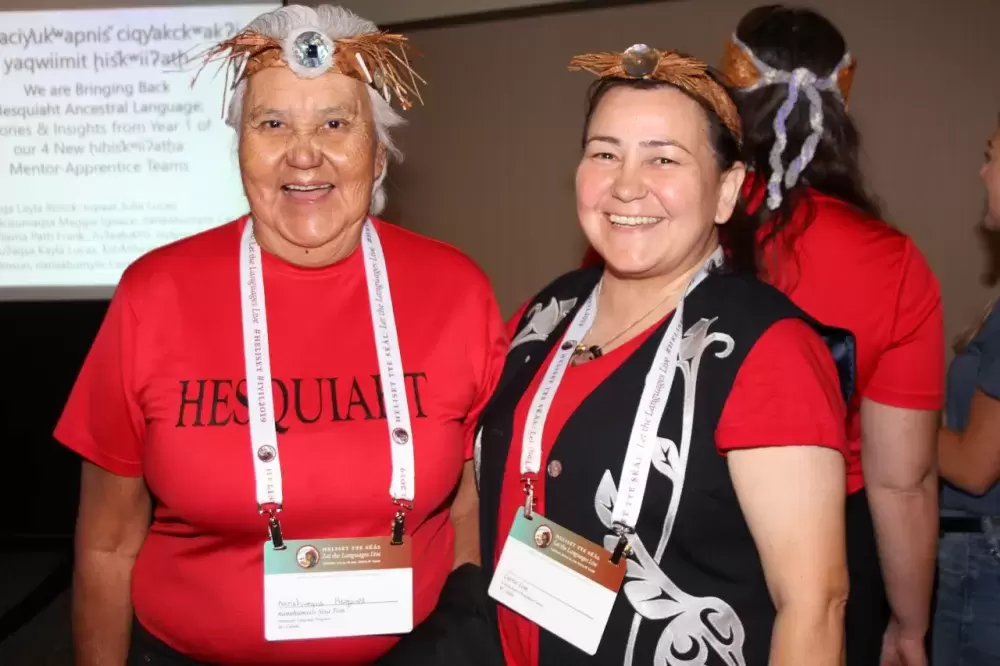A group of five women are learning the Hesquiaht dialect of the Nuu-chah-nulth language in a Mentor-Apprentice Program (MAP) that is going into its second year.
Led by Layla Rorick, who prefers to be called by her Hesquiaht name, chuutsqa, the four teams meet regularly to practise the language.
The program pairs four fluent-speaking elders with younger apprentices who have committed to work together to pass the language on to the next generation.
All involved in the program go by their Nuu-chah-nulth names during their time together. The elders: tupaat (Julia Lucas), maam`icisumaqa (Maggie Ignace), n`an`aaḥumyiis (Cecelia Tom) and čiisma (Patti Frank of Ahousaht) work with younger women; teaching them to speak Nuu-chah-nulth. The student’s names are ʔuʔaałukʷis (Jaylynn Lucas), n`aashuʔaqsa (Kayla Lucas), n`an`aaḥumyiis (Verena Wilhelmson) and n`an`aaḥumyiis (Carrie Tom).
Rorick has a Masters of Education degree in Indigenous Language Revitalization from UVic. She is a doctoral candidate studying Indigenous Language Revitalization. She works with a language nest that she helped to found, and helps mentor-apprentice teams across the province.
Rorick teaches language immersion courses both as a volunteer and as a sessional instructor in community partnership programs at UVic’s Indigenous Education Department, according to the university’s website.
In her spare time, she helps organize language immersion summer camps and creates free language learning resources for her nuučaan̓uł/ḥiškʷiiʔatḥ language websites
Members of the MAP group shared their experiences from the first year of their four-year MAP to people attending the Heliset TTE SKAL Indigenous Languages Conference held in Victoria in June 2019.
They each demonstrated their grasp of Nuu-chah-nulth as they introduced themselves using the language. One of the young mothers said that she is taking the lessons one step further, bringing the language back home to her child and teaching her the new words and phrases she has learned.
Hesquiaht elder Julia Lucas said she was hired as a language and culture teacher in the elementary school at Hot Springs Cove back in the 1980s.
There were very few resources, much less time, to teach the Hesquiaht language to the children.
“Back then I had half an hour a day to teach language and culture,” tupaat told the crowd.
But now that there are very few fluent speakers, the pressure is on to save the language. Julia and her peers are in high demand working in various language programs teaching people of all ages their mother tongue.
Thanks to support from the First Peoples Cultural Council, more consistent and sustained effort is being put into documenting and teaching Indigenous languages.
Rorick, who studies Indigenous Languages at the University of Victoria, manages the Hesquiaht language program. She spent three years studying the Hesquiaht language with fluent speakers, the late Larry Paul and Angela Galligos.
Through collaboration with other fluent speakers, chuutsqa has pulled together a variety of language resources that can be found on the Hesquiaht language website.
There is a Hesquiaht/English Dictionary project, a language tutor application, as well as information about language projects like the Language Nest, Language Camp and the First Nations Language Teachers Intensive program.
The website also has links to videos showing Nuu-chah-nulth elders from the past speaking the language.
Tupaat told a room full of conference-goers that she has noticed there is a huge difference between teaching the language to preschoolers as opposed to adults. The children, she noticed, are less inhibited and learn correct pronunciation of Nuu-chah-nulth words quickly compared to the adults, whose tongues are used to the English language.
Chuutsqa said it was through her work on the Hesquiaht/English dictionary with late elder Larry Paul that she became more fluent, learning proper pronunciation from Galligos. Projects like these help revive work from the past, allowing them to build on a base created by other language champions.
Rorick is preparing for an upcoming language immersion camp to be held in Hesquiaht Harbour in August 2019. The nuučaan`uł Language Summer Institute at Hooksum is geared to educators and committed language learners with full scholarships.
For more information about Hesquiaht language learning initiatives visit http://www.hesquiahtlanguage.org/







